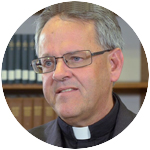
Father Thomas Dailey, O.S.F.S.
Long ago, St. Francis de Sales wrote about how “the heart and ears talk to each other” (“Introduction to the Devout Life,” III:21). Last week, Pope Francis published a message entitled “Listening with the ear of the heart” (for World Communications Day 2022).
The namesakes seem to have an odd sense of anatomy! But their metaphorical grasp on the make-up of human beings invites further consideration in terms of our interactions with one another.
Nowadays, those interactions are characterized, more often than not, by arguing. It seems endemic to politics, education, even religion. It appears inevitable, for whenever two or three are gathered, perspectives will clash.
The rhetorical trope of heart and ears talking to each other points to the experiential truth that what we hear makes an impact on us. The saint uses the image to advise being on guard against “foul words” spoken by supposed friends, whether as false flattery or suggestive immorality. The pope adopts the image, instead, to prompt us to listen more.
[hotblock]
On the one hand, his message acknowledges that communications today are hampered by too much speaking. Amid the polemics of social-political debate and an “infodemic” in the digital world, we find it hard to know whom and what to believe. As a result, we end up with greater polarization or increased indifference.
On the other hand, relationships also suffer from too little listening. We often engage in a “duologue” in which we are “waiting for the other person to finish speaking in order to impose our point of view.” As a result, we end up speaking past one another rather than conversing with each other.
In both cases, the pope writes, the real handicap to communication comes from within, from “an interior deafness worse than the physical one.” When ear and heart don’t speak to each other, listening becomes a lost art.
To resolve this interpersonal and social impasse, Pope Francis exhorts us not only to listen, but to listen well: “It is only by paying attention,” he writes, “to whom we listen, to what we listen, and to how we listen that we can grow in the art of communicating, the heart of which is not a theory or a technique, but the ‘openness of heart that makes closeness possible’.”
Nowhere are these three focuses needed more than in the journey toward synodality, which will soon be implemented in the archdiocese by way of various listening sessions.
Listening well starts with the “who.” It concerns our perception of the one with whom we are interacting. If we presume the other to be in opposition to us, or if we consider the other to be ignorant or mistaken, it makes listening to them a challenge, if not an impossibility. We will have already predetermined the need to counter or correct whatever they say.
[hotblock2]
But if we first decide, in our hearts, that the “other” shares that same image of God that dignifies all of us, then the interaction changes. Acknowledging the communion as brothers and sisters in the Lord that precedes our conversation, we are more likely to engage rather than enrage.
Listening well proceeds with the “what.” With mindsets predisposed to logical analysis, we seek clarity and strive for truth. We favor outcomes over processes. Consequently, we have little interest in mere opinions and will be quick to object to contradictions.
But if we open the ears of our heart we can learn where people are coming from, what they value, what matters to them. Morality necessarily makes clear the difference between right and wrong. But reality cannot always be reduced to binary thinking. Life is messy! When our hearts lead us to hear differing perspectives as just that — different, not necessarily better or worse — we put ourselves in a better position to bring about the clarity that we all need.
And listening well flourishes with the “how.” With our increasing busyness, time appears to be at a premium. Conversations without end, like meetings for the sake of meetings, seem to serve no purpose. In a world of information overload, patience easily wears thin.
But if we so choose, we can accept the “martyrdom of patience” it takes to listen. It’s neither easy nor expedient. It requires humility in the abnegation of our own interests. It calls for a commitment to the other person more than to the confrontation of our differences.
When we “let every person be quick to hear, slow to speak” (James 1:19), we practice Christian charity – which is always time well spent.
Charity comes from the human heart, transformed by the outpouring of the Sacred Heart. So, too, our communion in the church depends on anatomy – in communications transformed by listening with the ear of our hearts.
***
Father Thomas Dailey, O.S.F.S., is the John Cardinal Foley Chair of Homiletics and Social Communications at St. Charles Borromeo Seminary, Wynnewood.
PREVIOUS: This week, see the power of Catholic higher education
NEXT: Year three of COVID reveals technology’s limits


Share this story